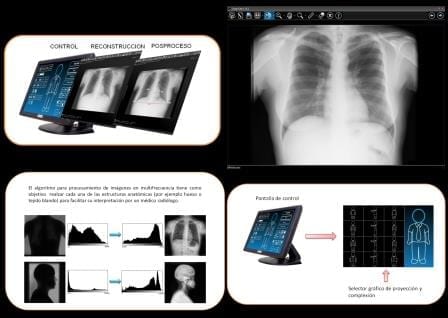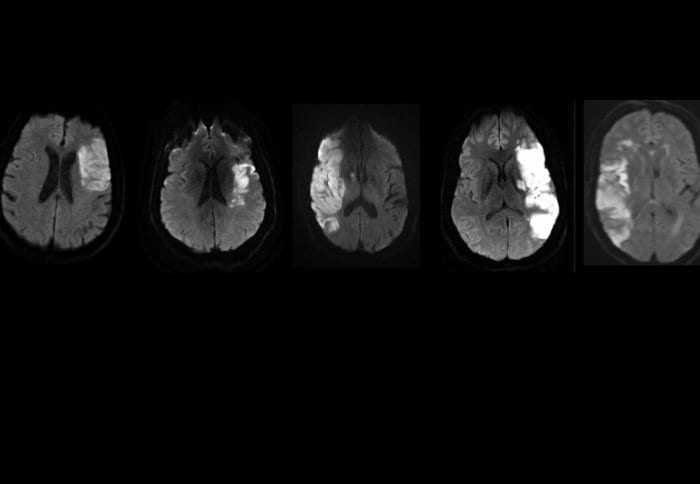
The non-invasive acoustic gastrointestinal surveillance biosensor.
Invention Monitors an Important New Vital Sign
A disposal, plastic listening device that attaches to the abdomen may help doctors definitively determine which post-operative patients should be fed and which should not, an invention that may improve outcomes, decrease healthcare costs and shorten hospital stays, according to a UCLA study.
Some patients who undergo surgery develop a condition called post-operative ileus (POI), a malfunction of the intestines. The condition causes patients to become ill if they eat too soon, which can lengthen an affected patient’s hospital stay by two to three days. Until now, there was no way to monitor for POI other than listening to the belly for short periods with a stethoscope, said study first author Dr. Brennan Spiegel, a professor of medicine at the David Geffen School of Medicine at UCLA and the UCLA Fielding School of Public Health.
If proven successful, the device, a non-invasive acoustic gastrointestinal surveillance biosensor called AbStats, could also be used to help diagnose irritable bowel syndrome and inflammatory bowel disease, in addition to helping obese people learn by the sounds from their gut when they should or shouldn’t eat to help them lose weight.
Read more . . .
The Latest on: Surveillance biosensor
[google_news title=”” keyword=”Surveillance biosensor” num_posts=”10″ blurb_length=”0″ show_thumb=”left”]
via Google News
The Latest on: Surveillance biosensor
- What Happens if a Powerful Surveillance Law Expires This Week?on April 17, 2024 at 5:00 pm
By Charlie Savage Charlie Savage has been writing about national security legal policy, including surveillance, for more than two decades. He reported from Washington. Published April 18 ...
- Opinion: We all lose if the Olympic surveillance state becomes the normon April 17, 2024 at 8:45 am
This is where there is the freedom of expression.” She added that AI-driven surveillance “is a way to shape public space according to the values of the government and police – and in the end ...
- The US isn’t just reauthorizing its surveillance laws – it’s vastly expanding themon April 16, 2024 at 12:33 pm
A little-known amendment to the reauthorized version of Fisa would enlarge the government’s surveillance powers to a drastic, draconian degree The US House of Representatives agreed to ...
- Key surveillance tool could run out Friday as senators struggle to reach agreement to beat deadlineon April 16, 2024 at 4:09 am
A critical intelligence community surveillance tool could lapse temporarily Friday unless senators reach an agreement to speed passage of a bill that would renew the program for two years. That ...
- domestic surveillanceon April 12, 2024 at 5:00 pm
Legislation to extend surveillance authorities that the FBI sees as vital in fighting terrorism was thrown into doubt Wednesday as President Donald Trump threatened a veto and congressional ...
- What is Fisa, and what does it mean for no-warrant spying?on April 12, 2024 at 2:21 pm
After a week of debate, Congress on Friday reauthorized section 702 of the Foreign Intelligence Surveillance Act Congress spent the past week in a fractious debate over a major government ...
- What Is the Powerful Surveillance Law That Divided Lawmakers?on April 11, 2024 at 5:00 pm
By Charlie Savage Reporting from Washington The House on Friday passed a two-year reauthorization of an expiring warrantless surveillance law known as Section 702, reversing course after the bill ...
- Surveillance bill stumbles again in US House on privacy concernson April 10, 2024 at 12:47 pm
WASHINGTON, April 10 (Reuters) - A modest overhaul of a controversial U.S. surveillance program foundered in the House of Representatives on Wednesday after Democratic and Republican critics ...
- The Final Act on Government Surveillanceon April 10, 2024 at 7:30 am
Speaker of the House Mike Johnson (R-LA) arrives for a House Republican leadership press conference, at the Capitol in Washington, April 10, 2024. A preliminary floor vote on a House rule to expand ...
- A FISA Surveillance Compromise Worth Passingon April 9, 2024 at 4:51 pm
Wonder Land: Speaking at the WSJ CEO Council on Dec. 10, 2019, Attorney General Bill Barr discussed Michael Horowitz’s report on alleged abuses of the Foreign Intelligence Surveillance Act.
via Bing News









